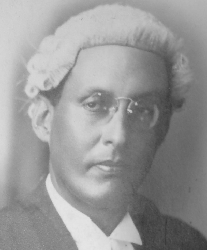
 HONORABLE CECIL EDGAR ALLAN RAWLE
(March 27, 1891- June 9, 1938)
HONORABLE CECIL EDGAR ALLAN RAWLE
(March 27, 1891- June 9, 1938)
Cecil Edgar Allan Rawle is Dominica's first national hero. He championed and fought for self government, and for a unified Caribbean all his life. Born in Roseau, Dominica, on March 27, 1891, his parents, William Alexander Romilly Rawle and Elsie Elizabeth Sophia Garrett, had moved to the island from Trinidad. His father was the head of the local branch of the Panama Telegraph Company, later Cable & Wireless. Cecil Rawle was well educated, attending the Dominica Grammar School, then Codrington College in Barbados, and finally London's Inner Temple, graduating as a barrister in 1913.
For a short time, Rawle practiced law in Grenada and Trinidad, before returning to Dominica to open his law practice. At that time, Dominica had no elected representation in the local legislature, so he formed the Dominica Representative Government Association to campaign for representation, and established the Dominica Tribune newspaper to make that case, educate the public, and build support. He was a committed and energetic champion of West Indian self government and West Indian integration.
In 1925, partly as a result of Rawle's relentless campaigning, the UK granted Dominica a new constitution with the island's first elected legislature; and Rawle was elected to represent Roseau. He was a fearless activist and indefatigable campaigner for self government and West Indian unity. In 1932, he organized, and was elected chairman of the path-breaking and successful West Indian Federal Conference in Dominica. This was the first regional meeting to be initiated by Caribbean leaders themselves to discuss the future of the region. It was Rawle's conviction, perseverance and networking that consolidated regional support for the idea of West Indian unity and the Dominica Conference. That conference brought attendees from almost all the British West Indian islands. At the end of their historic meeting, the conferees concluded: "Our work is to wash out the stains that now besmirch the Union Jack, stains of injustice towards weak nations … we are British to the core … But we demand that our flag shall be an emblem of Equality, Fraternity and Fairplay to all peoples over whose head it flies." Certainly, in the Dominica Conference's call for self determination and greater West Indian unity, one saw the first steps towards the British West Indian Federation (1957-1962) and the Caribbean Community (CARICOM). The conference lobbied the United Kingdom for greater representative government and autonomy. And the Federation, while short-lived, was a major step toward independence for the British West Indies.
In 1937 Rawle accepted the position of Attorney General of the Leeward Islands and moved to Antigua. Many saw this as a British plot to co-opt a rising Caribbean leader and a potential threat to British rule. Rawle died suddenly in Antigua on June 9, 1938 at the relatively young age of 47. His death has never been satisfactorily explained.
The Honorable Cecil Rawle is considered one of the founding fathers of West Indian integration. His legacy is often likened to those of other Caribbean greats such as Norman Manley of Jamaica, Captain Cipriani of Trinidad, Grantley Adams of Barbados and T.A. Marryshow of Grenada. At the attainment of Dominica's Associated Statehood in 1967, a bust of Rawle was erected on Federation Drive, in the Roseau suburb of Goodwill, to honor this great Dominican and Caribbean nationalist. He married Eva Shillingford and had six children - five girls and one boy.
For his lifelong championing of universal adult suffrage and the rights of Dominicans to be ruled by their own legislature, and for his commitment to West Indian integration, DAAS honors the Honorable Cecil Edgar Allan Rawle..
Contributed by:
Gabriel J. Christian
May 2011